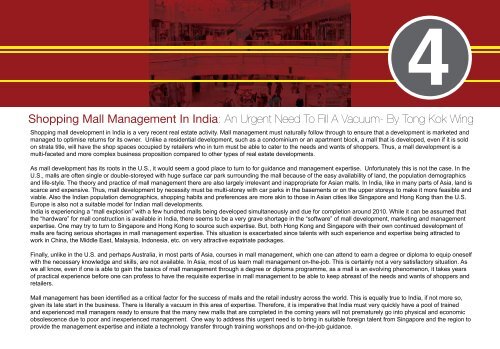INTERNATIONAL WORKSHOP ON MALL MANAGEMENT
international workshop on mall management - Indian Franchise ...
international workshop on mall management - Indian Franchise ...
- No tags were found...
Create successful ePaper yourself
Turn your PDF publications into a flip-book with our unique Google optimized e-Paper software.
4<br />
Shopping Mall Management In India: An Urgent Need To Fill A Vacuum- By Tong Kok Wing<br />
Shopping mall development in India is a very recent real estate activity. Mall management must naturally follow through to ensure that a development is marketed and<br />
managed to optimise returns for its owner. Unlike a residential development, such as a condominium or an apartment block, a mall that is developed, even if it is sold<br />
on strata title, will have the shop spaces occupied by retailers who in turn must be able to cater to the needs and wants of shoppers. Thus, a mall development is a<br />
multi-faceted and more complex business proposition compared to other types of real estate developments.<br />
As mall development has its roots in the U.S., it would seem a good place to turn to for guidance and management expertise. Unfortunately this is not the case. In the<br />
U.S., malls are often single or double-storeyed with huge surface car park surrounding the mall because of the easy availability of land, the population demographics<br />
and life-style. The theory and practice of mall management there are also largely irrelevant and inappropriate for Asian malls. In India, like in many parts of Asia, land is<br />
scarce and expensive. Thus, mall development by necessity must be multi-storey with car parks in the basements or on the upper storeys to make it more feasible and<br />
viable. Also the Indian population demographics, shopping habits and preferences are more akin to those in Asian cities like Singapore and Hong Kong than the U.S.<br />
Europe is also not a suitable model for Indian mall developments.<br />
India is experiencing a “mall explosion” with a few hundred malls being developed simultaneously and due for completion around 2010. While it can be assumed that<br />
the “hardware” for mall construction is available in India, there seems to be a very grave shortage in the “software” of mall development, marketing and management<br />
expertise. One may try to turn to Singapore and Hong Kong to source such expertise. But, both Hong Kong and Singapore with their own continued development of<br />
malls are facing serious shortages in mall management expertise. This situation is exacerbated since talents with such experience and expertise being attracted to<br />
work in China, the Middle East, Malaysia, Indonesia, etc. on very attractive expatriate packages.<br />
Finally, unlike in the U.S. and perhaps Australia, in most parts of Asia, courses in mall management, which one can attend to earn a degree or diploma to equip oneself<br />
with the necessary knowledge and skills, are not available. In Asia, most of us learn mall management on-the-job. This is certainly not a very satisfactory situation. As<br />
we all know, even if one is able to gain the basics of mall management through a degree or diploma programme, as a mall is an evolving phenomenon, it takes years<br />
of practical experience before one can profess to have the requisite expertise in mall management to be able to keep abreast of the needs and wants of shoppers and<br />
retailers.<br />
Mall management has been identified as a critical factor for the success of malls and the retail industry across the world. This is equally true to India, if not more so,<br />
given its late start in the business. There is literally a vacuum in this area of expertise. Therefore, it is imperative that India must very quickly have a pool of trained<br />
and experienced mall managers ready to ensure that the many new malls that are completed in the coming years will not prematurely go into physical and economic<br />
obsolescence due to poor and inexperienced management. One way to address this urgent need is to bring in suitable foreign talent from Singapore and the region to<br />
provide the management expertise and initiate a technology transfer through training workshops and on-the-job guidance.




